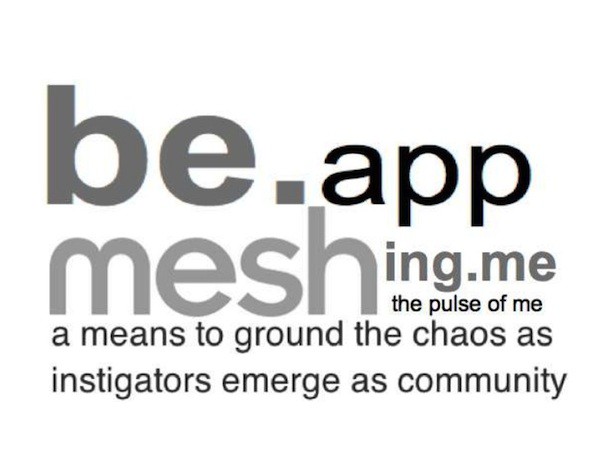Be.App: Towards Facilitating Curiosity

Many people are talking about (and creating) better ways to do public education. There are amazingly innovative ideas happening. However incredible, they aren't currently equitable; they aren't accessible to all. Imagine if rather than waiting to scale these ideas, we focus on scaling each individual.
Imagine a quiet revolution where individual choice not only sustains but exponentiates a true democratic society (Dewey's definition of public education). Imagine if the only thing standing in our way, is compulsion.
Our findings have brought us to re-imagining the city as the school. Imagine all the money ($1.3 trillion on public ed, $20-$50 billion on standardized testing, et al), time (7 hours a day, 12+ years, and ensuing mindset), and people, spent on public education, being funneled instead into our cities. Imagine enlivening our communities with what matters most to them.
We have found, the best way to unleash the genius in each person, the thing that gets them out of bed everyday, to put in the 10,000 hours of expertise, is to set them free, in spaces of permission, where they have nothing to prove. And we have found, once people are free to be themselves, their essence craves to connect, to co-create.
In order for this to happen, we are suggesting the removal of compulsion from our current definition of public education.
When that happens, chaos is sure to abound.
We're wanting to create and prototype this app to facilitate that chaos.
This app could facilitate three things in particular:
1) People talking to themselves daily, asking themselves if they are doing what matters. Self-assessment vs standardized assessment. We see this as the most important of five elements to start this anywhere.
2) People connecting to people in their city/community, a strategic serendipity. Finding others that are noticing, dreaming about, wanting to connect and/or do, the same things.
3) People's mesh network, their footprint or trail. The future intention economy, where credentialing comes from a networked individualism expanded/grown over time.
A couple of scenarios:
#1 Julia & Vicki & Tom
Julia, age 12, uses a donated/recycled laptop and the donated wifi from the wifi bank, to voice record the following before she goes to bed:
I noticed a lot of my friends’ parents have cancer. They keep talking about early detection. I asked my mom and she said if you find out early on, the cancer can usually be cured, but that not enough people find out early. I also watched a video of a 17-year-old that wrote a recipe to cure cancer and is now working at Stanford. I’m dreaming about finding ways to improve early detection. I want to connect to people who are experts at this and see what I can learn from them.
Vicki, age 25, uses her iphone and texts while waiting at the doctor’s office:
I just found out my mom has cancer. They told her they didn’t find it soon enough and that it’s spreading too fast. I’ve got to research myself, find out some other answers for her.
Tom, age 7, uses his mom’s ipad and his family’s wifi access, to record the following:
My mom has been doing this healing stuff my whole life. I’ve never believed in it before. But she started doing it with me, because I have/had asthma, and now I don’t have it anymore. I’m really interested in seeing if it can help people with cancer.
The app connects them.
A mesh network created for each of these could have one small node representing their intense curiosity and that’s it. Or, it could be the start of an offshoot node, as they advance into the study of health and medicine. Either way, this cancer node could be detected by the app in a couple weeks by someone else talking to themselves about the same things and then they all receive notification of another potential connection.
#2 Joe & Miguel
Joe, age 15, uses the free wifi from the wifi bank and his free recycled cell, and he texts on morning:
I notice we waste water every time it rains. The public sprinklers keep running. I would love to fix that.
Miguel, age 72, a retired teacher, uses his laptop and types that afternoon:
I noticed the sprinklers in the city run when it’s raining, I’m imagining saving tons of taxpayers money & water by fixing that, I want to connect to city people or whoever to figure out what can be done.
That evening, Joe and Miguel receive each other’s text #, with the topic that connected them, other numbers if others mentioned the same/similar, and possibly a suggested location for meeting up.
Joe, would already have a mentor/facilitator (be known by someone), but it may have initially been by appointment (ie: if everyone in our district was freed right now, 1:8 ratio, so we’d connect 8 kids to one adult just to get rolling). Joe & Miguel could hit it off and Miguel could become Joe’s person, or they could just fix the sprinkler problem and that would be it.
Depending on how things turn out...one of the nodes on Joe’s future mesh network could be the company he started for sprinkler systems, or that he got into programming from this initial venture.
The main benefits of the app:
- As people are freed up (ie: from the compulsory aspect of public ed), the initial chaos can be grounded by tech’s ability to facilitate and connect mounds of data.
- People will be connected within a community in order to do (create/discuss/learn about/etc) things that matter to them.
Check out our SlideShare below for more details. We’d love to hear your feedback. The more expertise we can throw toward this effort, the sooner we will see a more equitable public education.